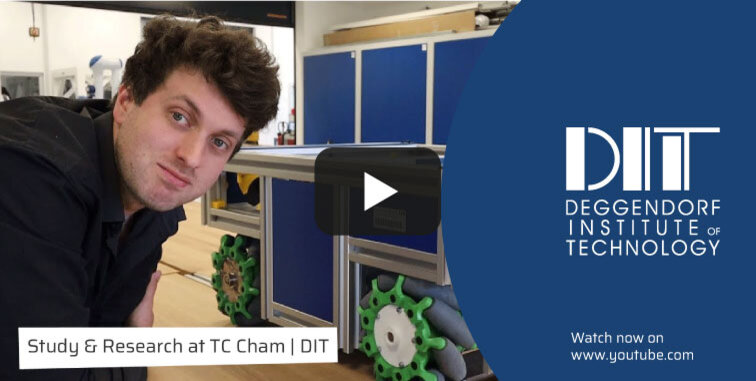Study at DIT
pioneering & vibrant
#count%
of all DIT graduates
will find a job
within 2 months

shaping transformation: robots as part of everyday life
#robotics #autonomoussystems #AI #control engineering #computervision #motionplanning #programming #image-processing #modelling #simulation
#ROS #automation #machinelearning #human-robot-interaction #embeddedsystems #statistics #technicalprojectmanagement #robotdynamics
The Master's degree programme in Robotics will be based on the content of the TC Intelligent Robotics and the requirements of regional companies and will include industrial and/or medical technology applications, for example. Graduates should be able to work in research and development, but also in industrial applications.
The internationally oriented Master's degree programme enables students to deepen their knowledge and understanding of robotics in general and the use of artificial intelligence in robotics in particular. By combining teaching content on robotics, systems engineering and human-robot interaction as well as machine learning and computer science, expert knowledge on the fundamental disciplines of intelligent robotics is imparted. In addition, students acquire specialist knowledge in the areas of perception in robotics, modern automatic control and decision-making systems (e.g. motion planning), robot modelling and simulation as well as on the application side in the field of industrial robotics and automation. This enables students to cope with the increased use of robotic systems in industry and to help shape this - from development and commissioning to application and interface analysis through to supporting end users.
Other key course content includes intelligent multi-agent systems and project-based case studies in the field of robot programming (ROS). Students acquire the necessary specialised knowledge, skills and methods to independently apply scientific findings and processes in industry and the service sector.
In addition, students acquire basic knowledge and skills in concepts, results and methods that correspond to the current state of science and allow them to familiarise themselves independently with further technical developments.
robotics profile
Degree programme: Master of Engineering (M.Eng.)
Standard study period: 3 semesters
ECTS-Points: 90
Start of study programme: March 2025 (summer semester)
Campus: Cham
Language of instruction: English
Application Period:
- Summer semester: 01 October - 01 December
- Winter semester: 15 April - 15 June
Admission requirements:
- The qualification for the Master's degree programme "Robotics" at the Cham teaching location is demonstrated by the completion of an undergraduate degree at a domestic or foreign university with at least 210 ECTS credits in the field of mechatronics, robotics or a related degree programme or by a degree that is equivalent to such a university degree. The examination board decides on the equivalence of the degrees on the basis of the documents submitted.
- For this reason, applicants who have acquired their previous academic education (e.g. Bachelor's degree) in non-member states of the Lisbon Convention are particularly recommended to enclose a GATE or GRE (general) as well as a recognised German language certificate with their application in order to substantiate their suitability for the programme.
- Additionally, the professional qualification for this study programme might need to be demonstrated in the context of an aptitude test. This written examination, in the subject areas relevant to Artificial Intelligence: Mathematics, Physics, Electronics & Electrical Engineering, Systems Theory, Control Engineering, Computer Science, Robotics, and Autonomous Systems is offered online as well as in presence at Campus Cham of Deggendorf Institute of Technology. It is used to determine aptitude for the specific degree programme and ultimately determines admission to the Master's degree programme.
For the application period for the summer semester / winter semester:
- For all applications received between 1st October and 1st December (summer semester) as well as between 15th April and 15th June (winter semester), the online admission test will take place shortly after the end of the respective application period.
- The date of the online admission test cannot be chosen, but is specified in the invitation letter from the examination board.
- Depending on the date of receipt of the application, applicants will receive this invitation letter either in the middle or at the end of the application period.
Language requirements for degree programmes at Campus Cham:
Fees:
- No tuition fees, only student union fee
- International students from non-EU/EEA countries are required to pay service fees for each semester. Click here to read about our service fees.
Contact:
- General information about the Master's degree programme "Robotics": studium-cham@th-deg.de
- Information on the aptitude test: master-mro-exam@th-deg.de
- General information about studying at DIT: Studienorientierung
CAREER Prospects
The programme equips students for scientifically grounded engineering roles in areas such as:
- Development, construction and application of robots in various fields of application, for example production and medical technology
- Development, construction and application of complex robot systems in the production environment
- Leading and managing technical projects
- Research and teaching
Attention is paid to a wide-ranging, qualified and scientifically sound education, which enables graduates to work in a variety of professions. Career opportunities are available not only in commercial and industrial companies, but also in research and teaching as well as in the private sector.
subject overview
Overview of the courses, SWS (semester hours per week) and ECTS (European Credit Transfer and Accumulation System) in the Master's degree programme "Robotics":
| 1. Semester | SWS | ECTS |
| Robot Dynamics | 4 | 5 |
| Advanced Methods in Control Engineering | 4 | 5 |
| Statistics and Machine Learning for Computer Vision | 4 | 5 |
| Technical Project Management | 4 | 5 |
| Embedded Systems | 4 | 5 |
| Cross-Cultural Development for Engineers | 4 | 5 |
| 2. Semester (Major: Intelligent Robotics) 2. Semester (Major: Assistive Robotics) | SWS | ECTS |
| Advanced Methods in Robotics Soft Robotics | 4 | 5 |
| Image-Processing and Computer Vision Sensor Fusion and Perception for Assistive Robotics | 4 | 5 |
| Robot-Modelling & Simulation Biomechanics | 4 | 5 |
| Industrial Robotics & Automation Rehabilitation Robotics | 4 | 5 |
| Case Study ROS Robot Programming Case Study Assistive Robotics for Improvement of Life Quality | 4 | 5 |
| Intelligent Multi-Agent Systems Human-Robot Interaction | 4 | 5 |
| 3. Semester | SWS | ECTS |
| Subject-Related Elective Course (FWP) | 4 | 5 |
| Master's Module | - | 25 |
| Master's Thesis | - | 20 |
| Master's Seminar (two parts: Master's colloquium (2 ECTS) and seminar series "Career Start into German Technology Companies") | 2 | 5 |




